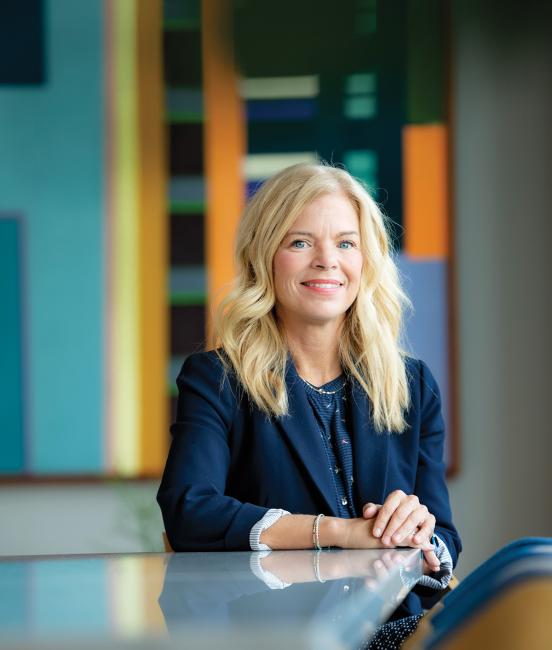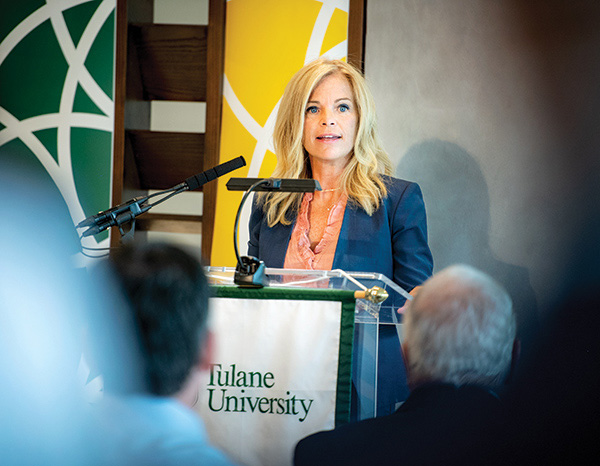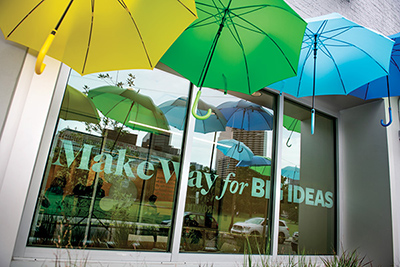Above: Kimberly Gramm is the new Innovation Institute’s inaugural David and Marion Mussafer Chief Innovation and Entrepreneurship Officer. (Photography by Paula Burch-Celentano)
At the dedication ceremony for the new Innovation Institute in June, with a backdrop of bright blue and green umbrellas, Tulane President Michael A. Fitts extolled the qualifications and experience of Kimberly Gramm, the inaugural David and Marion Mussafer Chief Innovation and Entrepreneurship Officer.
“We had an extensive search committee for the head of the institute, and Kimberly, as you should know, rose immediately to the top,” said Fitts.
The Innovation Institute is a multimillion-dollar, long-term project that will act as a combined technology and startup accelerator for university faculty, researchers, staff, students and community members. It is expected to have a major impact on the regional economy, attracting more than $100 million in capital and powering business and job creation.
The Innovation Institute is “a direct result of investments in research at Tulane,” said Fitts, noting the 50% jump in research funding between 2017 and 2021 with anticipation for another record year in 2022.
“Out of that explosion in research, the Innovation Institute will help advance Tulane’s most promising ideas for entrepreneurial development, creating new startups, accelerating those companies while fully engaging with the innovation and entrepreneurial communities in New Orleans,” said Fitts.
Thirteen15, the new Gravier Street residential and retail development on Tulane’s downtown campus, is the first stop for the Innovation Institute, which will move to a redeveloped Charity Hospital building within the next few years.
The Innovation Institute will serve as a “convener, collaborator and motivator” for startup talent in the community — and at Tulane, said Patrick Norton, senior vice president and chief operating officer. Driven by the university’s “core strengths in biotech, health sciences, energy, infectious disease and engineering,” the Innovation Institute will “harness and deploy the vast power of Tulane’s top-ranked research enterprise and welcome intellectual assets like never before.”
Under Gramm’s leadership, the institute will identify basic research that has potential to bring about marketable products and services. It will shepherd emerging research and technology approaches from the proof-of-concept phase to pre-seed investment and eventually venture investment.
Gramm has “a passion” for innovative technology activity and “an understanding of what it will mean to Tulane University,” said Fitts.
She has “an incredible track record,” he added.
Gramm is a seasoned leader of university innovation and commercialization projects. She has more than 14 years of early-stage technology venture development experience in Texas and Florida. Her initiatives have launched more than 279 startups, which have attracted more than $470 million in investment capital.
Gramm came to Tulane from Texas Tech University, where she was associate vice president of innovation and entrepreneurship, responsible for leading economic and industry engagement, increasing startup development, expanding commercialization programs for faculty and students, and growing the university’s innovation district.
With Gramm’s past success, Fitts said, “I can’t underscore enough how happy we are to have her on board.”
Visionary Support
Tulane’s Innovation Institute has three core pillars: entrepreneurial programming on campus, community engagement with the wider New Orleans startup community, and an innovation lab named after Robert L. Priddy (UC ’69).
Priddy, whose career spanned aviation and private equity, and his wife, Kikie, run the Priddy Family Foundation, along with their daughter and son-in-law, Shannon and Mike Acks, and their son, Christopher Priddy. The foundation made a lead gift to establish the Robert L. Priddy Innovation Lab.
“Throughout my career I’ve loved watching small ventures grow into thriving enterprises,” said Robert Priddy. “In the Innovation Institute, I see a promising idea with the power to capitalize on Tulane’s existing strengths and grow into something huge for the city and the Gulf Coast.”
Gramm said that the Priddy Innovation Lab “is designed to systematically provide resources to multidisciplinary teams that will test a technology, make sure it works and does what they thought it would to solve the problem. Does the innovation solve a problem for a market?”
The Innovation Lab will be a competitive environment, said Gramm. Inventors and creators will submit abstracts with their ideas along with proposed milestones for product development and budgets.
There is something called the Valley of Death in a technology/startup stage of development, said Gramm. Ideas can sometimes flounder, and products never get off the ground between when the inventor has an idea and the point when revenue can actually be generated.
“We think of revenue as the lifeblood of a startup company,” said Gramm. “Startups have to have money to survive so that they can become profitable.”
Many startups fail because they don’t have the resources to test whether or not the invention works. Or the startup may not have the capacity to identify a viable market. That’s where the Innovation Lab will have a major impact to support the progression of an idea to the market.
“The idea is creating things that people really need,” said Gramm.
Peas in a Pod
Researchers and entrepreneurs are alike, said Gramm. They both are testing hypotheses through a “humbling process of iteration.”
While researchers are validated through peer-reviewed journal articles, competitive grants funding and other accolades, “in the case of entrepreneurs, the market tells them if technologies or products are necessary and competitive,” said Gramm.
“Iteration is this process of evaluating something, testing it, and then going back, testing it again, making a small adjustment and getting it right.”

































































